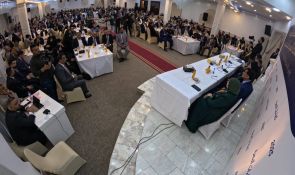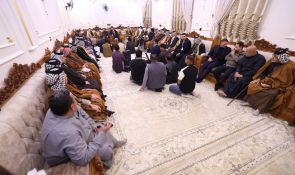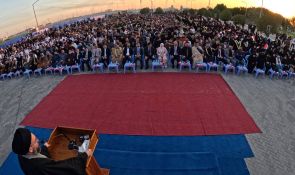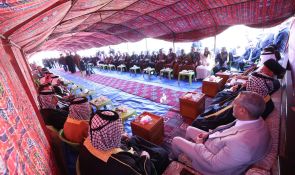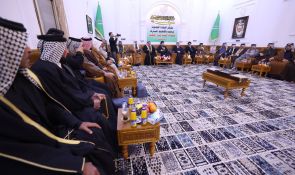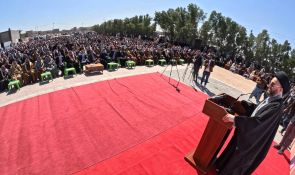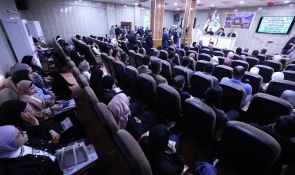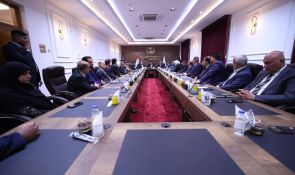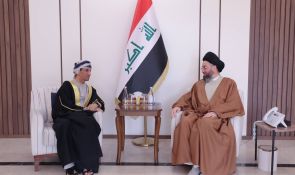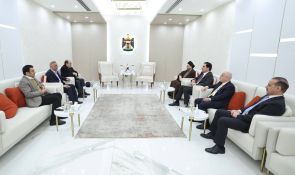SAYYID AMMAR AL-HAKIM: “The issue of Imam al-Hussain (Ú) is an ensuring, safeguarding and sponsoring of the Islamic Message plan.”
I congratulate you on these holy days of the great month of Sha`ban, the month of the Messenger of Allah (Õ), the second of the three months which represent an important season of adoration and self-examination in order to make sure of the soundness of the paths and steps that bring us closer to Allah Almighty. I also congratulate you on the occasion of the birth anniversaries of our holy and pure Imams (Ú): From the third of Sha`ban of the fourth Hijri year, when our master and the master of martyrs, Imam al-Hussain (Ú), was born, to the fourth day of Sha`ban of the 24th Hijri year when the Moon of the Banu Hashim, Abul-Fadl al-Abbas (Ú), was born, to the fifth of Sha`ban of the Hijri year 38 when our master, the master of those who prostrate and the best of those who worship, Imam al-Sajjad (Ú), was born.
There are no reactions or emotions in the stances of Ahl al-Bayt (Ú). Rather, it is the action, the needed steps undertaken at the right time…
This lengthy period extends not to differentiate between the dates of the births of these three lights, but to form an important station of convergence of these lights where there is one issue and one epic on the land of Kerbala. What do we say about our pure Imams (Ú)? Their roles are many, and their stances vary, but they are organized within one network that is harmonious and synchronized, one in which all these stances complement each other, one in which all these roles are fused within the same framework, crucible, goal, backgrounds and motives that prompt them to undertake this stance here or that stance there, according to the circumstances through which they pass. The Ahl al-Bayt (Ú) do so not due to their reactions or emotions but as an action, a needed step undertaken at the right time, yet they complement each other to form a frame, a movement and path in which all these many and diversified stances are fused.
In every station of Ahl al-Bayt (Ú), whenever we stand at it, we derive moral lessons for life. We always say that our Holy Prophet (Õ) and pure Imams (Ú) and the movement of prophets and Divine messages were not casual for one single day, were not events that took place and ended. Rather, they are like water: We need them for our life, for our daily realities. Ahl al-Bayt (Ú) are not light which we remember or a historic reality to which we refer and about which we read in history books in order to live our lives isolated from them. They are not like that. They are the role models, the lighthouse that lights our reality, our life. As we stand at the threshold of these three lights, we have to stop at some practical lessons from their lives in order to benefit from it in building our life in the light of these lessons and this knowledge…
Lessons and information derived from the lives of the three lights (Imams al-Hussain, al-Sajjad and Abul-Fadl al-Abbas)…
FIRST: How to fix the issue of Imam al-Hussain, the Taff epic, as a basic and pivotal issue in our daily life: There is a Divine planning, a Divine will, that the torch of the al-Hussain issue remains lit and moving in our lives, present in our daily lives. On every evening that precedes Friday, it is highly recommended to perform Ziyara of al-Hussain. In every Eid, in every day of Allah’s days, the Laylatul-Qadr, it is highly recommended to perform the Ziyara of Imam al-Hussain (Ú). Islamic feasts in the rituals of which it is highly recommended to perform the Ziyara of Imam al-Hussain (Ú): the 1st and the 27th of the month of Rajab and the 15th of Sha`ban, and so on, round the year, on every holy and blessed day, we see that it is highly recommended to perform the Ziyara of al-Hussain: This is an issue that is worthy of our attention: Ali (Ú), is the father of the Imams and their best, but the issue of Imam al-Hussain (Ú) was meant to be present in our daily lives. Whenever we want to drink water, we remember that call: “Whenever you drink clear water, remember me,” so we remember the thirst of al-Hussain (Ú), we remember how al-Hussain was wronged, and we remember the features and events related to al-Hussain (Ú) so that the al-Hussain issue remains before us, living with us as long as we live. Every time we drink, every movement we make, on every occasion, and at every juncture…, we have to remember al-Hussain (Ú)…
Al-Hussain (Ú) represents a path, a plan, a vision, and he represents a goal, a philosophy of life…
Al-Hussain does not represent just an individual. Al-Hussain represents a path, a plan, a vision; he represents a goal and a philosophy for life. Whenever we stand at al-Hussain, we stand at ourselves, and we face our paths and remember our duties and missions. We set the direction of the compass, we confirmed the soundness of the path, the precision of the venue that we tread and walk to achieve our hopes. This is a great lesson: How an issue turns from a battle among history’s lengthy battles, from one of history’s passing events, into a pivotal and central issue that lives in our daily lives, one which we live and from which we benefit lessons and morals! Whenever we meet and sit in an assembly, we remember our worries and bring back to memory the feats of our Holy Prophet (Õ) and his Ahl al-Bayt (Ú) and companions, al-Hussain (Ú) will be clear, before our eyes, attending it.
Al-Hussain’s issue ensures, safeguards and sponsors the Islamic Message’s plan…
From the Hiraa Cave to al-Hussain’s Kerbala, we can find the Islamic plan since its launching and up to reaching assurances in protecting and maintaining it. Al-Hussain’s issue has been a securing one, safeguarding and caring for the Islamic Message’s plan. It firmed the conclusion of this Message and stood in the face of all attempts at defrauding and deviating as well as the evil intentions of those who wish to derail the paths of the Islamic Message.
The SECOND LESSON: How to make some people miss the chance to disturb and falsify Imam al-Hussain’s plan. When this plan is central, pivotal and basic in our lives, it is doomed by some people disturbing it, and it is destined to be misread. It has to be protected against being derailed from its natural track. Quite many are the attempts of those who tried to derail this divine plan. They said that the issue of al-Hussain’s struggle is one of struggle for power. Yasid son of Mu`awiyah was a ruler, and al-Hussain was coveting his postion! It is an issue of a political struggle between two sides, two parties! They tried to give it a tribal dimension. They were vendetta attempts by Banu Hashim and Banu Umayyah, and they differed with each other during a lengthy history…
The Taff Epic: An issue in which the struggle between right and wrong, light and darkness, straightforwardness and deviation is personified.
How were al-Hussain (Ú), al-Sajjad (Ú), human huri Zainab (Ú) and those who had a role in continuing the plan and safeguarding it within the Divine design able to turn this issue from a snap picture and attempts to minimize it and to regard it as a casual political struggle into one in which the struggle between right and wrong, light and darkness, straightforwardness and deviation are personified, so much so that it became the compass? Where do people during the Hussaini role stand regarding the political stampedes, the interests, egotisms, partisanships and opportunism so they would set it aside? Where are the criteria in supporting righteousness so they would defend what is right and hold on to it, so they would be committal even if they sacrifice their lives for the sake of righteousness? Also, al-Hussain’s companions offered their blood cheap for the sake of this Message-related Divine plan. This justifies the nature of their presence. Al-Hussain comes out of Medina in order to lead a war, a bloody battle the results of which were death, martyrdom, the captivity of women and children… And al-Hussain says that he is going to a battle the result of which will be martyrdom in the cause of Allah. From the start of the march he (Ú) used to say, “Allah has willed to see me killed and to see the women captives.” He saw captivity from Day One. So, why did he take the women, children and the elderly? A battle needs youths to fight!
Diversity and presence in the issue of Imam al-Hussain (Ú) were able to achieve internal securities inside the plan in order to show the plan’s depth and noble goals distantly from falsification attempts…
We cast a look at his companions and find among them one who is from Quraish, a non-Arab, an Arab and slaves. We see John, the black slave, we see Habib ibn Muzahir the sheikh of the genuinely Arab tribe. We see Muslim ibn Awsajah, and we see a Muslim, a Christian and other religions. We see the rich and the poor. We see people of advanced social positions, and we see simple people. Al-Hussain took specimens, samples, of the society of the time. In this small group, there were specimens of the society of the time, all of it, because the issue was one of life: The plan is man’s plan in all its periods; therefore, mankind in all its types and social classes must be present in the Taff Battle. This justifies the diversity. Al-Hussain (Ú) was able through this diversity to avert all these accusations and attempts to disturb and falsify: It is a tribal issue between Banu Hashim and Banu Umayyah, but others had nothing to do with it. Most of those who were with al-Hussain (Ú) were not from Banu Hashim, so why did they fight? They say that it is a political struggle. But what does a Christian, a black man, an elderly sheikh and others have to do with politics? They did not have direct interests; so, why did they fight with al-Hussain? This diversity and presence was able to achieve internal securities inside the plan to show the depth of the plan and its noble goals distantly from all these falsification attempts. “I did not march out seeking to commit evil or indolence or corruption or oppression; rather, I marched out seeking to reform the nation of my grandfather the Messenger of Allah (Õ). I want to enjoin what is right and forbid what is wrong.” Clear slogans and shining goals so that there will be no room that this fact will be distorted by any side.
THIRD LESSON: Investing the event to firm the goal. Al-Hussain (Ú) had a goal. How did he employ this issue to firm, plant and set the roots of this goal in the minds and souls? You know al-Hussain’s goals, so do not distort the issue. The loose goals do not give a clear picture to the people. Al-Hussain (Ú) in this epic was able to give clear messages in forming this goal in people’s minds and consciences. Was the goal of martyrdom in the way of Allah a martyrdom operation? The goal was not the essence of martyrdom: Al-Hussain did not go to die, nor did he go before teaching us how to die. Al-Hussain’s message was not one of death. Al-Hussain’s message is one of life. He went to Kerbala to teach us how to live, that is, how to live with dignity and honor. If the society’s life, dignity and pride demanded that some of us should sacrifice, he taught us how to sacrifice so others would live. So, al-Hussain’s message is one of life, not of death. Yet history tells us that on the second day of Muharram, when he reached Kerbala, al-Hurr ibn Yazid al-Riyahi demonstrated his strength to him. Al-Hussain could see armies standing preventing him, not allowing him to continue his path to Kufa where the goal was this: He should enter into battle with them on the second of Muharram, is martyred with his companions, and this will be the end of the story. But he entered into long and wide negotiations, delegations, dialogues, communications and messengers, till the others joined him so the message would be clear and al-Hussain (Ú) would not be accused of being impatient and bear the responsibility from this standpoint. From the second day of Muharram up to the ninth, the armies came, the matters were completed, and they set up the tents. The negotiations and messengers continued. On the eve preceding the tenth, the negotiations reached a dead-end. There was no peaceful solution. Yet al-Hussain did not retreat, and the army had no intention to leave al-Hussain alone. They put him before two options.
The emotional dimension and its continuation in firming the plan’s truth, the issue which we clearly see in Imam al-Hussain’s issue…
The two options were: either to swear allegiance to the unjust ruler of the time (Yazid) or fight (“… between the basket and the humiliation; far it is from us to accept humiliation”). They wanted to kill him on the eve preceding Ashura, al-Hussain and 70 of his companions, facing 30,000 or 70,000 as narratives differ, and thus the military battle would be over. Al-Hussain (Ú) on that evening could enter into battle with them and become a martyr, but he sent a messenger to those folks asking them to give them that night as a respite so he could pray to his Lord. There was a buzz for them during the eve that preceded Ashura like that of the bees. The day of Ashura came. They performed the morning prayers and the army was ready to fight. The battle could have been settled in a quarter of an hour if both armies collided, but the battle went on from the fajr prayers to close to sunset, and it took place during very hot days. What is the interest in prolonging it, while it is already settled? Al-Hussain wanted to turn it into a big issue. During it, there were speeches and admonishments. See how al-Hussain (Ú) invested the event. This is a great lesson in how to invest this event in order to firm the goal. Also notice the feat-making movements of al-Hussain (Ú) who used to stand at anyone who was wounded to kiss him, whereas anyone who was martyred would be dragged and cleared from the battlefield. It is an issue which was quite uncommon in wars. But al-Hussain (Ú) used another way so the battle would take a longer time and its dimensions would become filled with lessons and admonishments, containing a deep message. Had al-Hussain been martyred on the second night of Muharram, would al-Hussain be the same one with whom we now deal? Or had al-Hussain been killed once, would the Taff issue remain so lofty and so wide as we now see it and become familiar with its mysteries? Al-Hussain (Ú) was not satisfied with these measures which he undertook in his lifetime. After his martyrdom, Imam Zain al-Abidin and Lady Zainab (Ú) continued it with their speeches, explanations, analyses and stances. After that Imam al-Sajjad (Ú) continued for 25 years, and some narratives say 45 years, that whenever water was served to him, he would weep, and whenever food was served to him, he would weep, too, continuously remembering the Taff. And there is the supplication program through which he tried to get these messages and to remind us of al-Hussain’s issue. This is investing the event to firm the goal, to get this message to reach us quite clearly: The emotional dimension and its continuation in firming the facts of the plan, of the issue; this is what we clearly see in the case of Imam al-Hussain (Ú).
FOURTH LESSON: Making room for creativity, for opening wide scopes before the people so they would participate and contribute to this human epic because it is everybody’s issue. Al-Hussain (Ú) was present during the battle, and he continued to be present for decades. Imam al-Baqir was young, but he was present in the Taff battle. The human huri, Zainab daughter of Ali (Ú), was present, too. We do not find any narrative or historic story telling by these great personalities. An important question: Imam al-Sajjad witnessed the event. Why did he not record for us a narrative by an Infallible Imam that tells us about the Taff incident in all its details? Why not? Perhaps the reason could be this: Had certain texts been written down, had one viewpoint been presented, we would all have accepted it. Everyone would have recited this single text. We would have been facing one single state of reciting this event. But when its broad lines were placed, and people were left to be creative in describing this issue, this permits the artists, painters, etc. to paint these portraits that describe aspects and scenes of this battle. Poets, men of letters, etc. enter to recite millions of poetry lines from that day and till our present day. The poetic imagination remains wide to describe this incident according to the ability of each poet. Books and researchers now write in biography books. Hundreds, if not thousands, of books have been written about this martyrdom so this issue may remain open, and everyone becomes creative, bringing something new. Everyone invents. Everyone presents. This is an important issue, and it is not a monopoly of a fact. Involving others in this issue helps deepening it and deepening the sense of partnership. Involving people in dealing with the facts with intellect, tongue, pen, rhymed song, play or film, etc., is an important education. The frame is put so we may not deviate. He permitted everyone to read many recitations, and this is an important and a great lesson.
FIFTH LESSON: Good ethics, loyalty, self-denial, preferring the public interest, defending what is right, readiness to offer relief, cooperation, solidarity, assistance: All these are the features and ethical faculties which we clearly see in the Taff battle. How can we stop at Abul-Fadl al-Abbas without remembering his loyalty? How can we remember the household of al-Hussain (Ú) and those of his companions without remembering all these great ethical feats? Al-Hussain’s issue has turned from a battle to a school in manners, behavior, relief and offering what is precious for the sake of the public interests. They recorded all those great epics; so, congratulations to them, and congratulations to us for them, and congratulations to us for holding on to their handle, for committing ourselves to their path, for following in their footsteps, for deriving lessons and admonishments from their biographies and path. We plead to Allah to enable us to follow the path of our Holy Prophet (Õ) and Pure Imams (Ú).
I say it for history: Everyone talks about his commitment to the constitution, everyone talks about his support for the constitution, yet some people violate this constitution when they make deals with others.
As we are in the courtyard of these auspicious birth anniversaries, felicities and merry occasions, we sense an urgent need to stand with the self in a true moment to remember our reality and concerns which we now live in our Iraqi reality: Our beloved country is going through a strangulating crisis which may be the most serious since the fall of dictatorship and the firming of the regime of justice, honor and human dignity for the Iraqis through our new system. This crisis may be the toughest during the past nine years. What can we say while speech has lost its impact before this crisis and its continuation and aggravation of complicating this crisis, the accumulation of negativities, so much so that the solutions and treatments are getting harder day after day? In this dark tunnel where we walk, what can one say when a Wednesday comes and I ponder on what I should say to our citizens through this weekly podium? I worry about our citizens standing one day and saying, “Sayyid Ammar! You keep repeating the same words…” Ammar and others are all servants of this nation. They do not hold in their hands the staff of Moses or a magic wand to perform solutions which must meet listening ears and a serious will so they may be implemented and so the intense political crisis which we are now facing may be bypassed. Men are tested with stances. Stances do not test men. We now badly need to subject the present political class to a test, the class that is present in our Iraqi scene in all its movements and trends. Everyone must ask himself: Where are we going? Are we going to an open confrontation by everyone and with everyone? If it is so, let us be honest with our citizens and tell them this fact because this nation is the first victim, the first to bear the harms of this confrontation, and it has the right to know that there is a decision among the political class to go to open confrontations among them so it may get ready for this affliction and condition itself and make its statement if this is what it wants. And if we are walking alogn the path of understanding, reconciliation and meeting under the banner of the one homeland, we must know that there will be no reconciliation, nor understanding, save by offering exchanged concessions and all sides being ready for these concessions. But if everyone is rigid in his opinion, everyone sees himself as being absolutely right…, the problem will not be solved. If there is building on reconciliation, understanding and meeting, there is no way except t hat everyone expresses his readiness for mutual concessions for each other, and that they advance the general right over their own rights. It is then that we can reach middle solutions. There is no solution through courtesies, loose words, speeches, slogans, calls… These will not solve the problem. Nowadays we are facing a moment of the truth. We need daring steps and clear stances so we can achieve what our citizens expect of us. People are not concerned about the language of politics and of politicians. Rather, they are concerned about the langue of services which they need, the language of solving the basic issues from which they suffer. What is the most serious in this crisis is the attempt by some politicians to shift the political struggle to the street. They now push in the direction of sectarian and ethnic ditches where people’s sentiments are stirred with such tone. It is playing with fire. Everyone will pay its price without any exception. I say it to history: Everyone talks about his commitment to the constitution. Everyone talks about his support for the constitution, but some people violate this constitution when they make deals with others. Everyone talks in the name of legitimacy, but he circumvents it when he disputes with others. Everyone talks in the name of the homeland and patriotism, but some people are not ready to advance right over his personal right, the public interest over his personal interest.
We do not see that drawing the vote of confidence from the government now as representing a viable solution for the political crisis which we nowadays are facing. Also, we do not think that attacking and belittling the government solves it. Most sides are partners in this government. This is the right solution.
From the very beginning, we made our statement quite clearly and frankly that we respect all constitutional measures. Every constitutional step wins our respect and appreciation. But we do not see that withdrawing the vote of confidence from the government now as representing a viable solution for the political crisis which we are now facing. We also do not think that attacking and belittling the government, while most sides are partners in it, as the right solutions for the present crisis. We do not think that abusing the parliament, targeting it and underestimating the value and prestige of the parliament, which is the legitimate frame in our parliamentary political system, as a successful step. If the head of the government is targeted, this head came to power as a result of understandings and consensuses among these sides. Whoever wants to undertake a step to change this head must go back to the same table and sit with the partners with whom he made agreements and submit his objections, complaints and evidences for the violations, if there are any, then gets ready to listen to the other objections, complaints and evidences for violations, if there are any. Through mutual frankness and openness, when people sit at one table, these partners can reach a result and make the sound decision among them.
If we are truthful about desiring real solutions and treatments for their crises, that we want to build a real state, we have to undertake the path of frankness and openness distantly from political courtesies.
We have to be clear, honest and realistic in our attitude towards this crisis, and let us abandon the language of political courtesies. Courtesies do not solve any crisis, nor do they build a state. If we are truthful about desiring real solutions and treatments for our crises, that we want to build a real state, we have to adopt the path of frankness and openness distantly from political courtesies. But we, at the same time, do not accept violent and tense reactions from this side or that. So, what does it mean to deal with excitement about withdrawing the vote of confidence from the head of parliament, and are we in a time the label of which is withdrawing the confidence? This wants to withdraw the vote of confidence from someone, while the other wants to withdraw the vote of confidence from someone else as a third, a fourth…, everyone wants to withdraw the vote of confidence! Is this the solution for the problems, that we all go as every side targets the leader or symbol of the other side and raise the slogan of withdrawing the vote of confidence from him? This will add more disputes to the repeated disputes in our political process in Iraq. Had withdrawing the vote of confidence been the solution for problems, why do we not use it as a general culture for our citizens? Anyone who has a problem should go and withdraw the vote of confidence from his official and fellow. This is not the solution. This is not how crises and standing problems among us are resolved. Lately, an article by a writer stopped me. The article’s title says: “Where is this trust so we may withdraw it?!” I noticed that the writer is right in this outlook and in this attitude to which he draws attention in his article. The crack in trust is the basic problem that cause crises, one after the other. When trust among politicians is lost, each side will go without limits to the policy of bone breaking and arm twisting of the other side. This does not build a state, nor does it treat a crisis. Also, we do not find the calls to early elections to be a logical and realistic solution for the crisis which we now live. We say so while we are the first of the groups that now benefit from elections. Let us compensate for the injustice inflicted on us in the previous elections. The Movement of the Martyr of the Niche benefits from early elections, but we look realistically and say: What will the early elections do for us? We will go to the elections to see the results and outcomes of these forces and personalities. This entity lost a number of seats, whereas that entity will add to its seats, and the result will be the same, and so will be the equation. Let us face our brothers and partners who now stand after the elections. What shall we do? What shall we change? This is fleeing from diagnosing the problem. We have to go to real solutions and treatments to the current crisis. In addition to the technical obstacles, the Independent Higher Electoral Commission now says that the elections of the governorate councils in March of next year cannot be held because the budgets are not being paid, and the Commission is not ready; it needs longer and greater preparations. So, how can we go to early elections while we do not have the needed tools?
We do not see that this language, these actions and paths which we now witness in the political scene in Iraq as the sound way to reach real solutions and treatments.
Where is the consulting with political partners? Early elections need a parliamentary majority that raises the hands in the parliament, and the parliament cannot be dissolved by any side other than itself: It is the one that dissolves itself. So, where is this parliamentary majority if no talks are held with all sides in order to achieve this purpose? In the political process, all options remain subject to study but we do not think that it is the step that can treat the problems facing us now. We see that this language, actions and paths which we now notice in the political scene in Iraq are the right way to solve these crises and reach real solutions and treatments, but we, at the same time, realize that there are mistakes some of which are big and others small, and these mistakes have to be dealt with. We have to put assurances for not repeating them in the future, be they mistakes by the government or towards the government. All these mistakes must be extracted and dealt with so we may prevent them from happening in the future.
We hope the respected head of government will take the initiative to undertake communications with the disputing parties in this crisis. This will greatly contribute to minimizing the sensitivity that now exists.
We hope the respected head of government wll undertake the initiative to contact the disputing groups in this crisis. This will contribute to a great degree to minimize the sensitivity that now stands. This lies in the essence of his tasks and responsibilities, for he is the head of Iraq’s council of ministers; he is the executive head of the executive authority in the Iraqi state, and he is the general commander of the armed forces. This position obligates him to take the initiative and stay in touch with the groups and to help resolve this crisis. Such a move will be credited for him and not against him. It will be recorded in his political history that he demonstrated the readiness, and he moved and participated in containing this crisis and took the political process back to its right course.
We all know that we have no choice except that everyone undertake steps towards each other. This stubbornness by any group cannot serve or help resolving the standing crisis. It cannot bring about a clear result. Also, the language of each group casting doubt about and accusing the other group of treachery will not help enhance the trust. It will deepen the gap among the groups more and more. Also, being shielded behind sectarian and ethnic slogans push the country towards the pitfall, and those who take part in such steps will have to bear the responsibility for it.
Dialogue and ignoring chit-chat is the sound entrance that will help us take matters back to their right course.
Betting on the time to budge the crisis is the method that will not bring about a result. If it does bring about a result, it will only be temporary, and the bet will reverse itself to those who bet it, and its consequences will be dire. The mutual threats of withdrawing the vote of confidence and of questioning this head and that put the parliament out of commission. They do not let it perform its duties and constitutional tasks in coining laws and legislating what serves the people, solves their problems and treats the daily crises in their lives. It will distract the parliament from performing its basic monitoring duty over the performance of the government and monitoring the institutions as they perform their duties and natural missions. This will put the country outside the constitutional legitimacy and will practically put the parliament out of commission. This must not happen. We must work seriously for the return of stability to the parliament so it will be busy with its real duties and missions. Let everyone know that this crisis is not between angels and demons. Rather, they are leaders and politicians who are practicing an important role in tough and exceptional circumstances. They may err, and all of them have committed many errors; so, is it time now for us to make a real, serious and courageous stand with ourselves and admit these errors and put an end to these crises? Is it now opportune for us so we all may stand and say: Enough crises, let us go back to understandings among us, for dialogue and forgetting about hearsay is the sound entrance that will help taking the matters back to their right course. We have to go back to give preference to the public interests over other interests so we may leave our fingerprints in the memory of history, so history will mention us well and we may earn the trust of our citizens when they find in the class, elite and leaderships those who bring about their interests and defend their rights. We see that the time is opportune for making such an important decision which the leaders of the country undertake, and that we must go to the dialogue. We must remember that when fighters fight, as history tells us, they end their wars by sitting down at the table of dialogue to talk with each other. So, where are we going? We do not encourage any leader in Iraq to imagine, not even for one moment, that he can end his battles with a capitulation document from this side or that. Nobody can exclude other from the arena. It is our destiny to live together, to be together, to be partners, to learn from history’s experiments, to derive morals from it before we ourselves turn into history lessons so others may learn lessons from us. History repeats itself. There is no option, nor is there a way, other than make an understanding with the partners and thus resolve our problems among ourselves. We plead to Allah, the most Praised and Ealted One, to guide us to what is good and righteous, with the blessing of these sacred days and auspicious birth anniversaries, that we witness a real breakthrough for this crisis and a return to the unity, accord and harmony among all Iraqis. I say so as I seek Allah’s forgiveness for myself and for you all; peace, mercy and blessings of Allah with you all.


